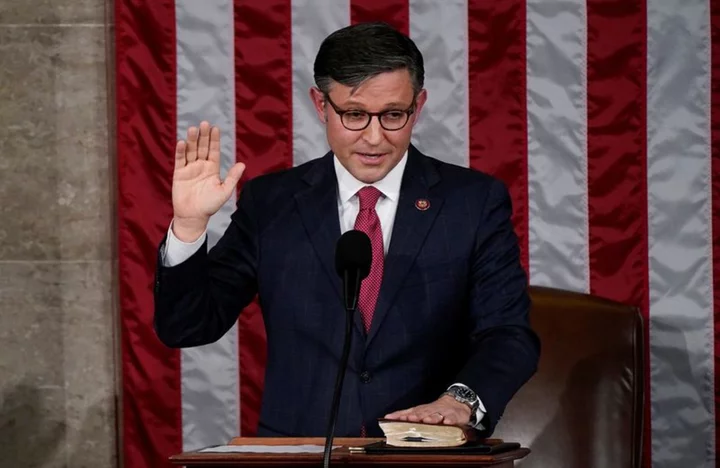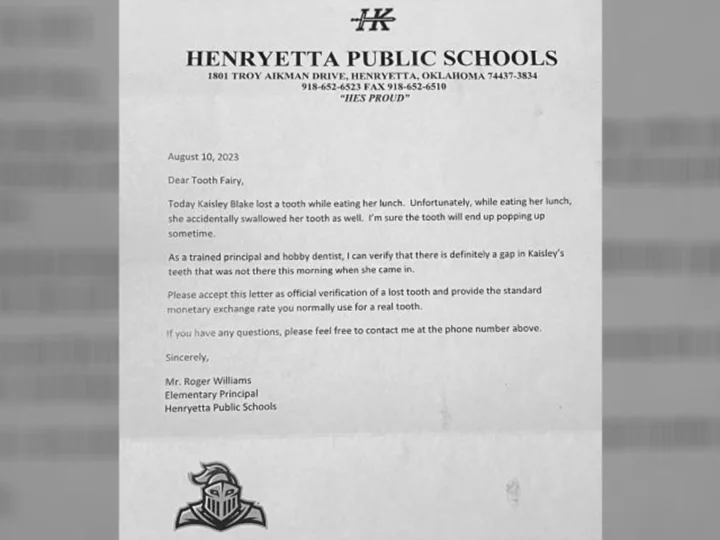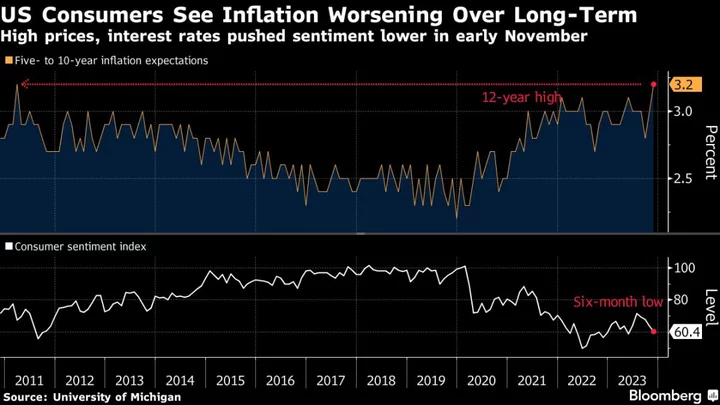By David Morgan
WASHINGTON Republican Mike Johnson, the untried speaker of the U.S. House of Representatives, faces an early test of how well he can unify his splintered majority as he tries to avoid a partial government shutdown a little more than two weeks away.
The fourth-term lawmaker from Louisiana will try to pass three 2024 spending bills, which could help placate hardline conservatives, before turning to a stopgap measure to keep federal agencies funded past Nov. 17.
But tensions between party hardliners and centrists, which led to the historic ouster of Johnson's predecessor early this month, are threatening to undermine the bills which would fund the legislative branch; transportation, housing and urban development; and the Department of the Interior and the environment through Sept. 30.
"They're at risk," said Representative Don Bacon, a centrist Republican from Nebraska who warned that hardline demands for deep spending cuts could further split the conference.
Johnson has already heeded hardliners' demands by calling for a Thursday vote on a $14.3 billion bill to aid Israel in its war with Hamas. He has severed that aid from funding for Ukraine, despite objections by Democrats and some Republican moderates, and heeded hardline calls to pay for the aid by cutting money Democrats previously allocated to the Internal Revenue Service.
Senate Majority Leader Chuck Schumer, the top Democrat in Congress, said he was "deeply troubled" by the move.
"The new speaker knows perfectly well that if you want to help Israel, you can't propose legislation that is full of poison pills," Schumer said on the Senate floor.
'LITMUS TEST'
The measures will pose an early test of Johnson and his narrow 221-212 majority's ability to agree amongst themselves and to work with Democrats, who hold the Senate majority and the Oval Office.
"This will be a litmus test," said Representative Ryan Zinke, a Republican who sits on the House committee that sets spending priorities. "There's going to be some groaning and moaning, but I think they'll pass."
The U.S.'s budget deficit soared to $1.7 trillion in the fiscal year ended Sept. 30, the highest outside the COVID era. Rising interest rates, the high costs of the Social Security and Medicare programs and the lingering effects of a 2017 tax cut have pushed the nation's debt over $33 trillion.
Hardliners are pressing for spending cuts and policy wins, such as tighter border security, as part of any temporary funding measure known as a continuing resolution, or "CR," to avoid a partial government shutdown.
Former Speaker Kevin McCarthy was ousted by a small band of hardliners after agreeing to pass a CR with Democratic support. The intraparty brawl that followed has left many Republicans wary of picking another shutdown fight.
"We just wasted three weeks with whatever this last goat rodeo was," said Representative Kelly Armstrong of South Dakota. "It's very difficult for members in tough districts to go home and explain any reason for a shutdown right now."
That raises the likelihood of Johnson ultimately opting for a "clean" CR without conditions or spending cuts.
Johnson has floated the idea of a CR that would run into January or April and cut spending 1% across the board - including defense.
In their full-year bills by reassigning previous allocations for Democratic programs to their own priorities, House Republicans have proposed spending a net $34.8 billion on Interior and the environment, a 10% overall cut with a 39% reduction for the Environmental Protection Agency, according to a Republican fact sheet.
With a similar use of previously allocated money, House Republicans would spend a net $65.2 billion on transportation, housing and urban development, 25% below current levels.
The third bill, which funds congressional operations, could be in trouble because of opposition from Republicans who say a 4.6% cost of living adjustment for lawmakers - their first in 15 years - is unconstitutional.
Even if passed, the House Republican bills have no chance of succeeding in the Democratic-led Senate or being signed into law by Democratic President Joe Biden.
But Republicans believe they can strengthen their hand in spending negotiations with the Senate by passing all 12 bills for fiscal 2024, which began on Oct. 1.
"We need to utilize the new opportunity with the new speaker to take steps to at least demonstrate that we're taking this seriously," said Representative Bob Good, a hardline conservative from Virginia.
While the House has focused on passing spending bills with only Republican votes, the Senate has worked on measures that have bipartisan support.
Some Republicans say the severity of the cuts sought by hardliners ensure that the legislation will not become law.
"I wish these people played chess a little more," Bacon said. "If they could think two or three moves deeper, we'd be in a better spot."
(Reporting by David Morgan; Editing by Scott Malone and Alistair Bell)









